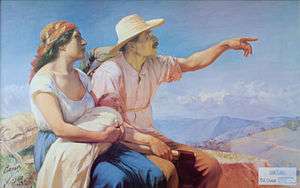Horizontes
Horizons (Spanish: Horizontes) is a 1913 oil painting by Francisco Antonio Cano Cardona.[1] Horizons shows the idealized migrant family and it portrays a colono family –consisting of a husband, wife, and child– sitting on a bluff, surrounded by mountains. The three members of the family are often referred as a version of the Holy family, with the woman dressed in colors like the Virgin Mary, with a baby on her lap.[2] The gaze of the wife, child, and father are in the direction of the man's outstretched hand, which evokes Michelangelo's Creation of Adam, and that points toward an unseen horizon.[2]
| Horizontes | |
|---|---|
 | |
| Artist | Francisco Antonio Cano Cardona |
| Year | 1913 |
| Medium | Oil on canvas |
| Location | Museum of Antioquia, Medellín |
The painting is a part of the permanent collection of the Museum of Antioquia, located in Medellín, Colombia.
History
Horizons was painted in Bogotá after the painter moved there from Medellín.
References
- Santiago Londoño Vélez; Francisco Antonio Cano (2002). La mano luminosa: vida y obra de Francisco Antonio Cano. Universidad Eafit. p. 115. ISBN 978-958-8173-16-0.
- Nancy P. Appelbaum (2003). Muddied Waters: Race, Region, and Local History in Colombia, 1846–1948. Duke University Press. p. 152. ISBN 978-0-8223-3092-9.